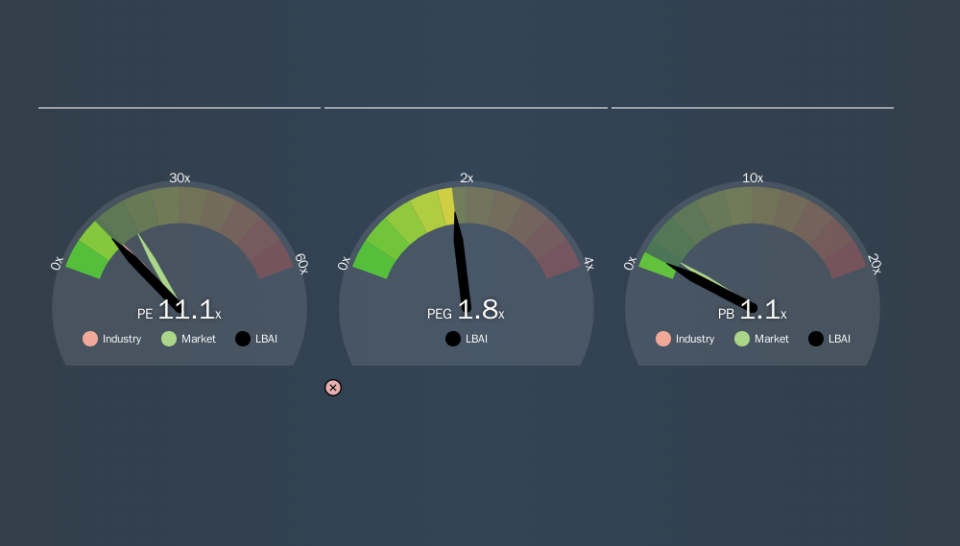Read This Before You Buy Lakeland Bancorp, Inc. (NASDAQ:LBAI) Because Of Its P/E Ratio

Today, we'll introduce the concept of the P/E ratio for those who are learning about investing. We'll apply a basic P/E ratio analysis to Lakeland Bancorp, Inc.'s (NASDAQ:LBAI), to help you decide if the stock is worth further research. Lakeland Bancorp has a P/E ratio of 11.1, based on the last twelve months. That is equivalent to an earnings yield of about 9.0%.
View our latest analysis for Lakeland Bancorp
How Do You Calculate A P/E Ratio?
The formula for price to earnings is:
Price to Earnings Ratio = Share Price ÷ Earnings per Share (EPS)
Or for Lakeland Bancorp:
P/E of 11.1 = $14.68 ÷ $1.32 (Based on the year to June 2019.)
Is A High Price-to-Earnings Ratio Good?
The higher the P/E ratio, the higher the price tag of a business, relative to its trailing earnings. All else being equal, it's better to pay a low price -- but as Warren Buffett said, 'It's far better to buy a wonderful company at a fair price than a fair company at a wonderful price.'
How Does Lakeland Bancorp's P/E Ratio Compare To Its Peers?
The P/E ratio indicates whether the market has higher or lower expectations of a company. If you look at the image below, you can see Lakeland Bancorp has a lower P/E than the average (12.2) in the banks industry classification.
Lakeland Bancorp's P/E tells us that market participants think it will not fare as well as its peers in the same industry. While current expectations are low, the stock could be undervalued if the situation is better than the market assumes. If you consider the stock interesting, further research is recommended. For example, I often monitor director buying and selling.
How Growth Rates Impact P/E Ratios
Earnings growth rates have a big influence on P/E ratios. Earnings growth means that in the future the 'E' will be higher. Therefore, even if you pay a high multiple of earnings now, that multiple will become lower in the future. Then, a lower P/E should attract more buyers, pushing the share price up.
Lakeland Bancorp saw earnings per share improve by -9.4% last year. And earnings per share have improved by 12% annually, over the last five years.
Remember: P/E Ratios Don't Consider The Balance Sheet
It's important to note that the P/E ratio considers the market capitalization, not the enterprise value. Thus, the metric does not reflect cash or debt held by the company. In theory, a company can lower its future P/E ratio by using cash or debt to invest in growth.
While growth expenditure doesn't always pay off, the point is that it is a good option to have; but one that the P/E ratio ignores.
How Does Lakeland Bancorp's Debt Impact Its P/E Ratio?
Lakeland Bancorp's net debt equates to 41% of its market capitalization. While that's enough to warrant consideration, it doesn't really concern us.
The Verdict On Lakeland Bancorp's P/E Ratio
Lakeland Bancorp trades on a P/E ratio of 11.1, which is below the US market average of 17.5. EPS grew over the last twelve months, and debt levels are quite reasonable. The P/E ratio implies the market is cautious about longer term prospects.
When the market is wrong about a stock, it gives savvy investors an opportunity. As value investor Benjamin Graham famously said, 'In the short run, the market is a voting machine but in the long run, it is a weighing machine.' So this free visualization of the analyst consensus on future earnings could help you make the right decision about whether to buy, sell, or hold.
But note: Lakeland Bancorp may not be the best stock to buy. So take a peek at this free list of interesting companies with strong recent earnings growth (and a P/E ratio below 20).
We aim to bring you long-term focused research analysis driven by fundamental data. Note that our analysis may not factor in the latest price-sensitive company announcements or qualitative material.
If you spot an error that warrants correction, please contact the editor at editorial-team@simplywallst.com. This article by Simply Wall St is general in nature. It does not constitute a recommendation to buy or sell any stock, and does not take account of your objectives, or your financial situation. Simply Wall St has no position in the stocks mentioned. Thank you for reading.

 Yahoo Movies
Yahoo Movies 

